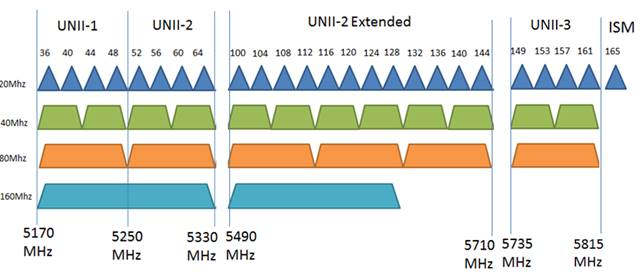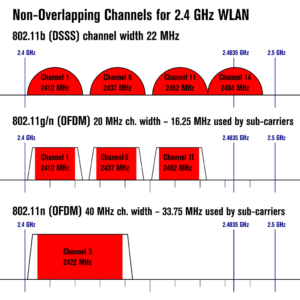
2.4GHz or 5GHz ? You will decide the winner
Whenever you are in the market or buying a network device online, you always face one major problem, the product specifications. Does that part of the box of the product seem Greek or German to you? Most of the times we all buy the products just by observing the market trend and we end up knowing that the product does not satisfy our needs. But what went wrong and when?
2.4GHz or 5GHz
A Little knowledge about the technical specifications can ruin the fun of a new product. Let us dig into one of the most widely used specifications on the network devices and try to understand how we can satisfy our needs just by understanding few important and basic concepts.

5Ghz Band (Image from Netgear)

2.4Ghz band
Concepts
We have all observed one of the followings specification written on any network/telecommunication device: 2.4GHz or 5GHz. We all know that frequency is defined in hertz and frequency, means in layman’s term ‘occurrence of anything in a cycle(second)’. If we are dealing with frequency, we should also understand the concepts of range and bandwidth. The “range” is the difference between the maximum and minimum of any quantity, whereas “bandwidth” is the amount of data which can be transferred from one point to the other in a given period of time.
Technical Comparison
Applying all the concepts we learned above, we should be now able to understand that the 2.4GHz device will transmit data with slower speed than the one with 5GHz.
In ideal conditions, the device having a frequency of 2.4Ghz carries data transfer at speed of around 450-600 Mbps and the one with 5GHz will carry data at speed of around 1.3 Mbps.
Knowing this, one will definitely go for buying the 5GHz device but there is a very important fact that you should know before buying one. 5GHz devices are less efficient in traveling large distances. They will not be able to penetrate through the walls and solid objects also.
So, if you need a device which can provide you faster data and there is no or very fewer penetrations through which the device waves will travel, it is always advisable to purchase the 5GHz device.
On the other hand, if you stay at a place with lots of obstacles, it is advisable to use the 2.4GHz device. Though it will give you signals with low data transfer speed, it will be stable enough and will be available up to a larger distance.
Conclusion
So, to answer the question that which one is better than the other, the answer would be, “They cannot be compared”. If one needs high-speed data, they should go for 5GHz and if the stability of signals and range is important one should go with 2.4GHz.
Also, if someone has other devices running at 2.4GHz around resulting in interference and connectivity issues then it is advisable to switch to 5GHz. In the end, it is always better to assess one’s requirement before purchasing the devices. Ultimately, one should decide his winner himself!
Recommendation for wireless router with 5GHz band
TP-LINK Archer C9: This one is our pick as the best wireless router for home as it support 802.11ac and Beamforming technology.
About the Author David
An engineer passionate in networking, coding and several sports
